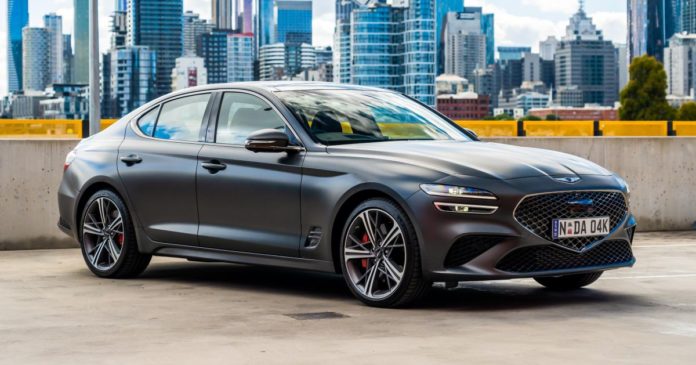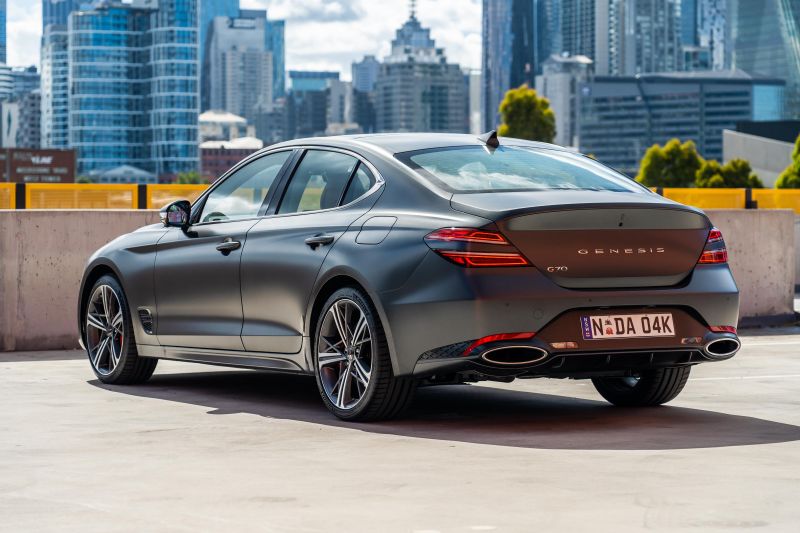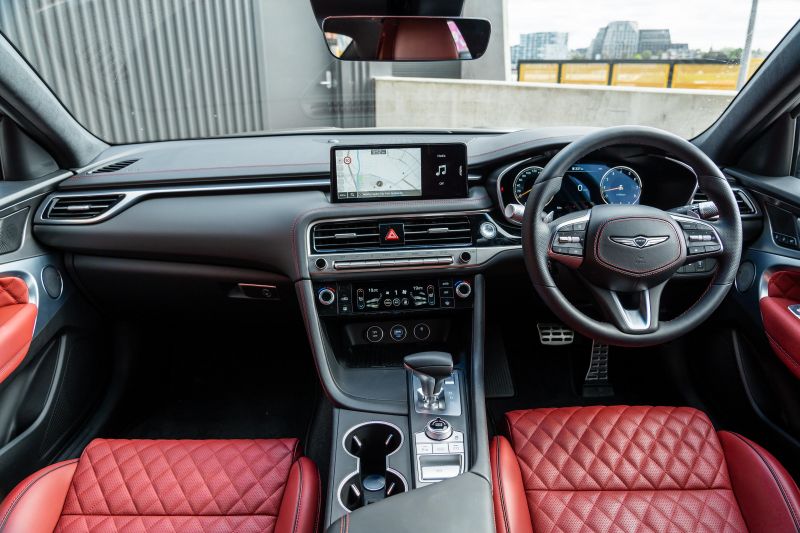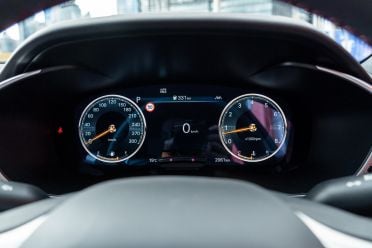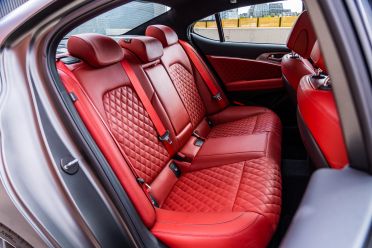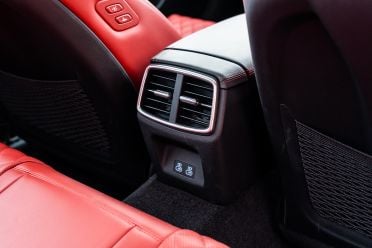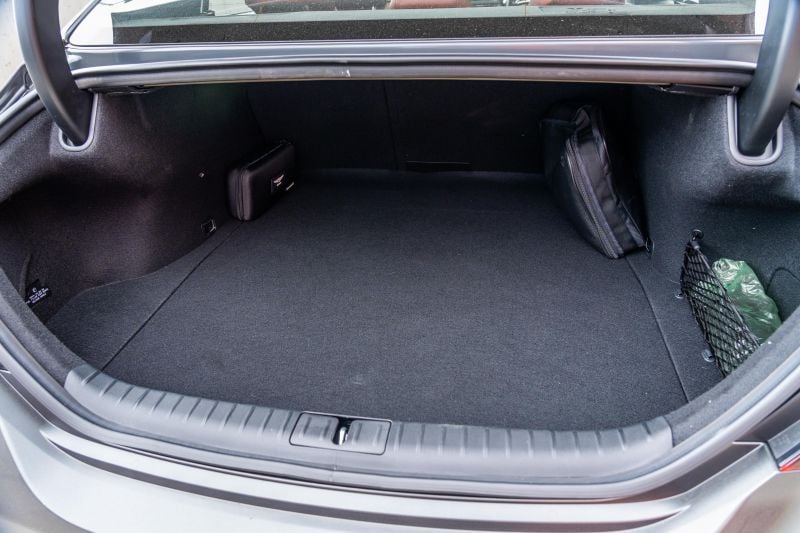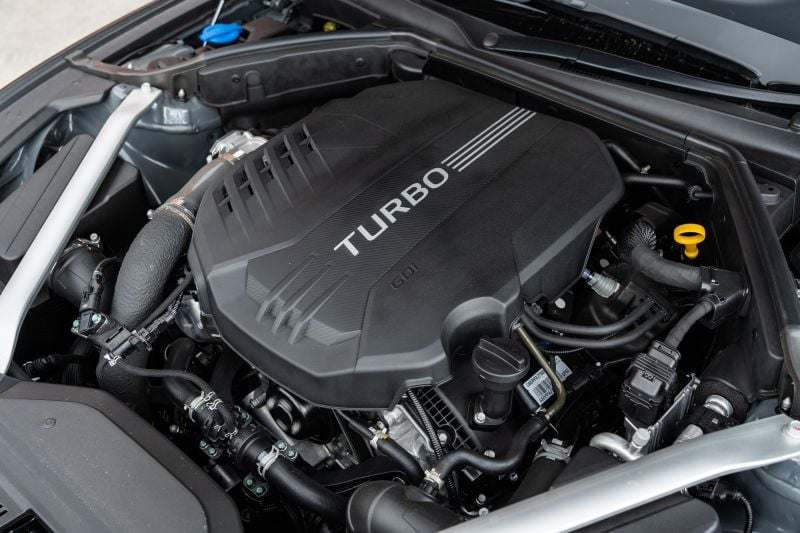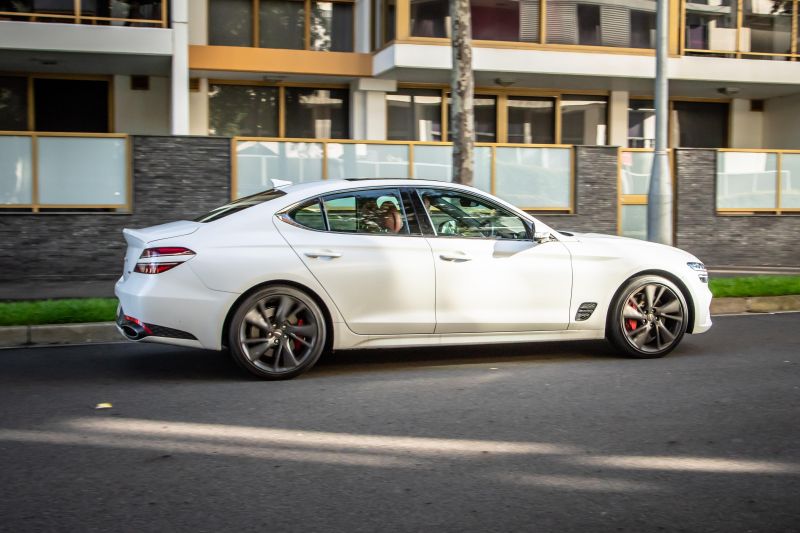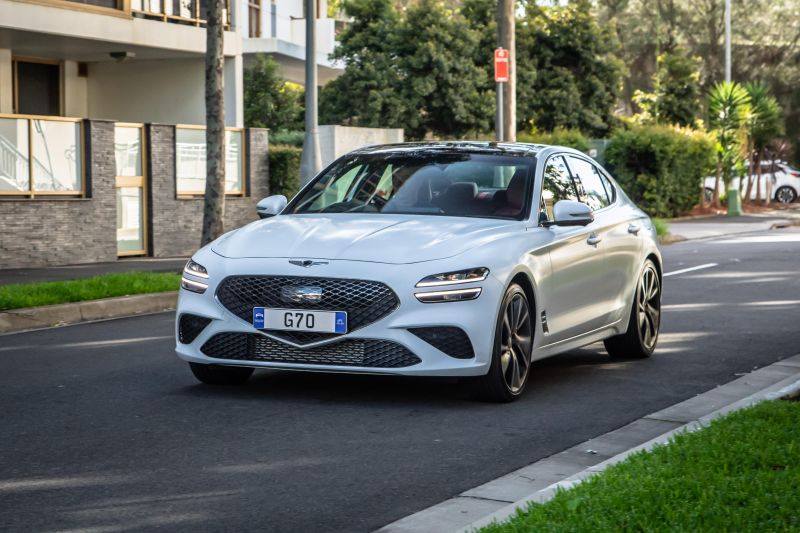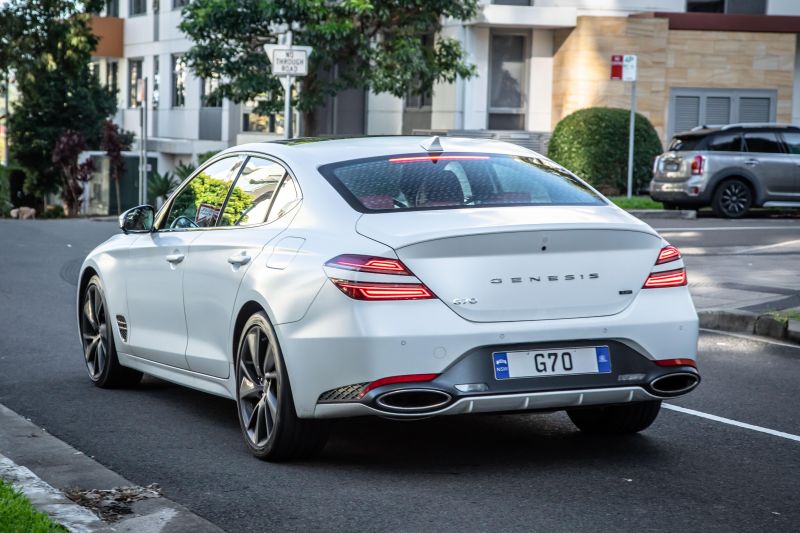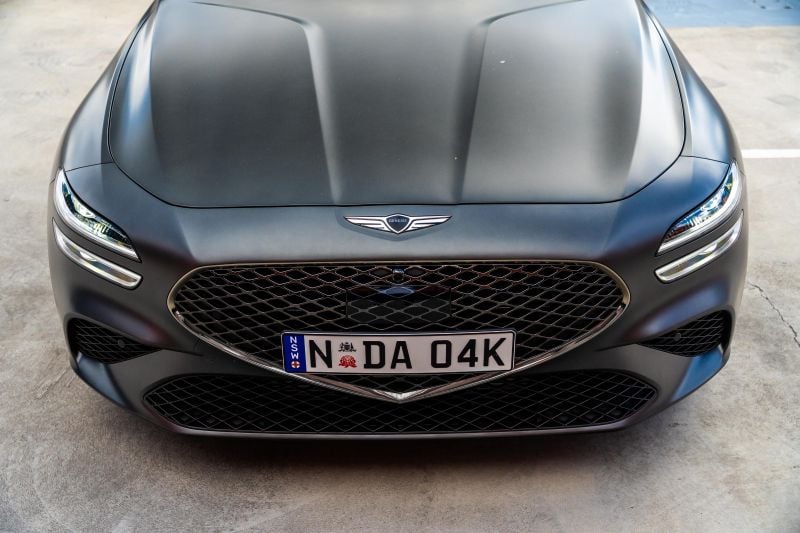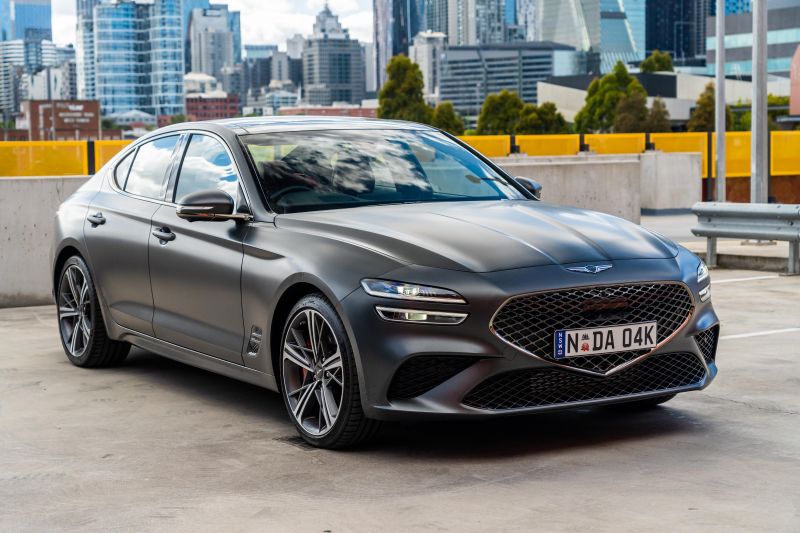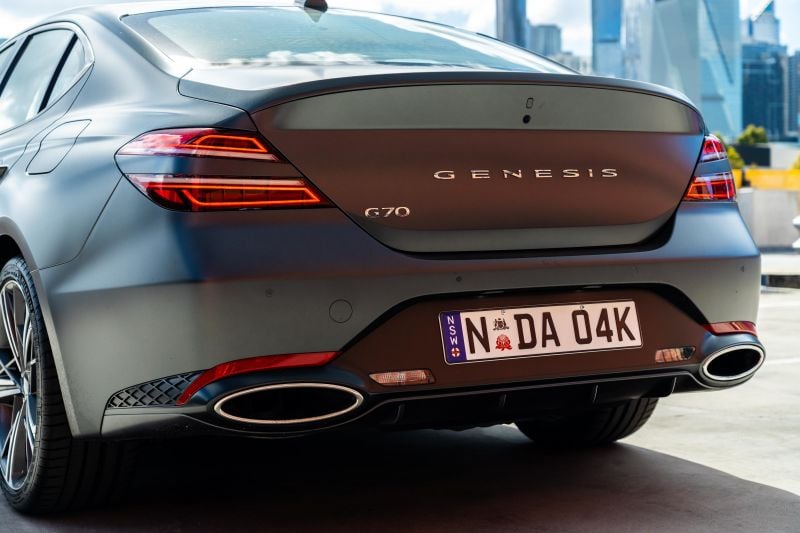Genesis now offers three electric cars in Australia, but it hasn’t abandoned the old ways just yet.
The Korean luxury brand, which is to Hyundai what Lexus is to Toyota, has stood by its slow-selling G70 sedan in Australia. Just 81 were delivered in 2023, making it rarer than the BMW 7 Series, but Genesis isn’t pulling the plug.
With more technology, minor styling changes, and an updated suspension system, the G70 has been tweaked for 2024. The range has been slimmed down, and the price of entry has leapt by $18,000.
Clearly, even the updated G70 won’t be giving the Toyota HiLux or Ford Ranger any headaches atop the sales charts.
We’re glad Genesis has stuck with it though, because the 2024 Genesis G70 3.3T Sport Luxury will make the few people who buy it very happy.
How does the Genesis G70 fare vs its competitors?
View a detailed breakdown of the Genesis G70 against similarly sized vehicles.
Genesis
G70
How much does the Genesis G70 cost?
Genesis G70 pricing
- 2024 Genesis G70 2.0T Shooting Brake Sport Line Luxury: $81,000
- 2024 Genesis G70 3.3T Sport Luxury sedan: $88,000
All prices exclude on-road costs.
The only option is matte paint ($2000) – our tester was finished in Makalu Gray matte paint.
The Genesis G70 competes with some well-known luxury sedans in Australia. To see how it shapes up, use our comparison tool.
What is the Genesis G70 like on the inside?
Genesis has made a raft of subtle but significant changes to the cabin of the G70, and really lifted it in the process.
Gone is the ugly old steering wheel, and the old climate controls – which always looks and felt a bit Hyundai parts bin – have been ditched in favour of the touchscreen from the GV70 SUV.
There’s now a row of silver toggles on the dash to jump around the infotainment system, rather than the cheap buttons on the pre-update car, and Genesis has ditched the Hyundai indicator and wiper stalks in favour of expensive-feeling units complete with Bentley-style knurling on their ends. These all sound like small changes, but they add up.
The pre-update G70 was fundamentally good, but felt a bit cheap. You can’t level that accusation at the car on test here.
The quilted red leather is lovely, and the driving position is excellent once you’ve lowered yourself in past the B-pillar. You can drop the seat right down onto the floor, and the seats themselves offer a great blend of bolstering and long-haul comfort.
You’re also able to extend the under-thigh support, and tighten or loosen the electric bolsters to suit your tastes.
Regardless of how the seat is set, headroom is tight up front for tall drivers. The latest BMW 3 Series feels like a 5 Series in drag, and even an Alfa Romeo Giulia offers a decent sense of space up front.
The G70 cocoons you, and feels half a size smaller than those rivals – it’s not claustrophobic, but it’s probably closer to it than it really should be.
The updated dashboard brings with a touch-based set of controls for the air-conditioning, which are within easy reach and put plenty of rivals in the shade for usability. If we’re ditching buttons, this is the way to do it.
The new row of silver toggles sitting above it make it easy to jump around the infotainment system, which is a reskinned version of the Hyundai software gradually being replaced across its range.
As a result, it’s simple enough to use and handsome enough to look at… but misses out on wireless smartphone mirroring, which it really should have in 2024. A USB-A port under the dash supports wired mirroring, and there’s a wireless phone charger at the base of the dashboard.
As for the 3D instrument cluster? It initially had me feeling cross-eyed, because it’s too magnified in its most aggressive mode – but you quickly adjust when it’s pared back slightly.
It’s a shame there’s no mapping, performance gauges, or more interesting layouts on offer. What’s the point of digital dials that just look like analogue dials?
Storage is good around the cabin. The door pockets are spacious, there’s a wireless phone charger under the dashboard, and the under-arm storage bin is perfect for wallets or snacks.
Rear seat space is incredibly poor, though. With the driver’s seat set for my 6’7 frame there is literally (not figuratively) no rear legroom, and even with a normal-sized driver there there’s minimal space for legs and feet.
There’s a pair of ISOFIX points and three top-tethers back there if you do want to fit a child seat, although we’d recommend looking at one of the car’s German rivals if you’re regularly using the second row.
The G70 has a sexier roofline than a more traditional, three-box executive limousine, but it comes at the cost of practicality.
Then again, we know the people who used to buy cars like the G70 are now going for mid-sized SUVs, so rear-seat practicality might be less of a concern than it once was.
You get a fold-down armrest with cupholders, air vents, and USB charging back there, along with heated seats given the Luxury Pack that was once optional on the G70 has now been made standard.
Boot space is a claimed 330L with the rear seats in place. The space itself has a letterbox opening that makes it less practical for boxy items, and you’ll need to crouch down to spot items hidden in the boot’s deeper, darker corners.
What’s under the bonnet?
| Model | Genesis G70 3.3T |
|---|---|
| Engine | 3.3-litre V6 twin-turbo petrol |
| Power | 274kW |
| Torque | 510Nm |
| Transmission | 8-speed automatic |
| Driven Wheels | Rear-wheel drive |
| Weight | 1765kg (kerb) |
| Fuel economy (claimed) | 10.2L/100km |
| Fuel economy (as tested) | 13.4L/100km |
| Fuel tank | 60 litres |
| Minimum fuel requirement | 95 RON |
How does the Genesis G70 drive?
This is an old-school sports sedan in the best way.
-
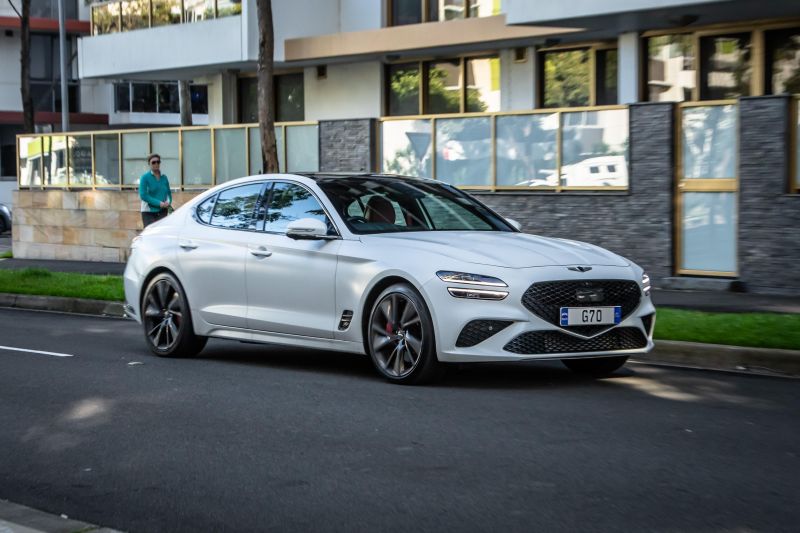
MY22 G70 3.3T Sport shown
BMW and Mercedes-Benz have moved away from six-cylinder engines in most of their sedans. The BMW 330i that’s priced in line with the G70 is a four-pot, and Mercedes-Benz won’t sell you a C-Class with more than four cylinders.
Sure, modern four-cylinder engines punch well above their weight, but the brawny 3.3-litre engine in the G70 makes them feel a bit undercooked. Shared with the now-dead Kia Stinger, the V6 makes this a seriously quick sedan in a straight line.
Plant your foot from standstill and there’s a beat of lag as the turbochargers spool up, and then the engine picks you up and deposits you down the road. Even in the dry, it’ll light up the rear tyres if you’re greedy with the throttle.
The traction control steps in quickly and shuts things down when the back end gets squirrelly unless you’re in Sport+, at which point it leaves you to your own devices… but keeps the stability control active, in case ambition outweighs talent.
Lean on the throttle and it just rides a wave of turbo torque, surging around effortlessly. It’s a shame it sounds a bit flat, because otherwise it’s a lovely engine.
The eight-speed auto is a smooth mover, and fades into the background in daily driving. There’s no learning curve here.
Despite the punchy engine, the G70 is a relaxed and comfortable commuter. The ride is excellent over pimply city streets, the steering is light enough to park with one hand, and the car’s compact proportions – which hurt its back seats and boot so badly – make it easy to place in tight spaces.
It’s impressively refined, with minimal road noise sneaking into to cabin on poor road surfaces, and the twin-turbo V6 has plenty of punch on hand to squirt past traffic if you’re into the traffic light grand prix.
Given how thirsty it can be in town though, the G70 is arguably happier on the open road.
The V6 engine settles down nicely in eighth gear, humming along quietly below 2000rpm, and the relaxed ride is a nice relief from scores of supposedly “sporty” SUVs with stiff suspension.
If you do want stiffer suspension, heavier steering, or a sharper throttle, you’re able to mix and match settings in a custom drive mode.
Genesis’ adaptive cruise control is smooth and smart, and the lane-keeping assist does a good job nudging you back between the white lines when you stray.
The active lane centring is a bit too hands on for my liking though, and it’s a shame this update brought with it the infuriating speed limit warning system proliferating through the Hyundai and Kia range.
It’s not good enough in a base Hyundai Kona, let alone a luxury express worth $100,000 on the road.
What do you get?
G70 2.0T Shooting Brake Sport Line Luxury highlights:
- 19-inch alloy wheels
- 225/40R19 + 255/35R19 Michelin Pilot Sport 4 tyres
- Space-saver spare
- High-performance dampers
- Brembo brakes
- Limited-slip differential
- Intelligent Front-Lighting System
- Automatic high-beam
- Acoustic laminated windscreen and front door glass
- Sunroof
- Sport Line appearance package
- Dark chrome grille, window surrounds
- Black grille insert
- Genesis Connected Services (NEW)
- Frameless electro-chromatic interior mirror (NEW)
- Electro-chromatic exterior mirrors
- Rain-sensing wipers
- Nappa leather upholstery
- Heated and ventilated front sport seats
- 16-way power driver’s seat with memory
- 12-way power passenger seat
- Heated rear seats
- Leather-wrapped dash, doors and console
- Alloy pedals
- Aluminium inlays
- Suede headliner and pillars
- Power tilt, telescopic steering wheel adjustment
- Keyless entry and start
- Dual-zone climate with touch controls (NEW)
- 12.3-inch 3D digital instrument cluster
- Head-up display
- 10.25-inch touchscreen infotainment system
- Satellite navigation with live traffic
- DAB+ digital radio
- Apple CarPlay, Android Auto
- Over-the-air updates (NEW)
- 15-speaker Lexicon sound system
G70 Sedan 3.3T Sport Luxury adds:
- Electronic Control Suspension with Sport+ mode
- Active variable exhaust
Is the Genesis G70 safe?
The Genesis G70 has a five-star ANCAP safety rating, based on 2018 testing.
It received an adult occupant protection score of 81 per cent, a child occupant protection score of 86 per cent, a vulnerable road user protection score of 69 per cent, and a safety assist score of 81 per cent.
Standard safety equipment includes:
- 10 airbags incl. front-centre, rear-side
- AEB with Pedestrian, Cyclist detection
- AEB Junction Assist
- Adaptive cruise control with stop/go
- Blind-spot assist
- Blind-Spot View Monitor
- Intelligent speed limit assist (NEW)
- Lane keep assist
- Lane Following Assist (lane centring)
- Leading vehicle departure alert
- Multi-collision brake
- Rear cross-traffic assist
- Surround-view camera
- Safe exit warning
- Rear occupant alert
- Front, rear parking sensors
How much does the Genesis G70 cost to run?
All Genesis G70 models come with a five-year, unlimited-kilometre warranty (for privately operated vehicles) and five years or 50,000km of complimentary scheduled servicing; servicing is required every 12 months or 10,000km.
Genesis also includes 10-year, unlimited-kilometre 24/7 roadside assistance, and a five-year/unlimited-kilometre offer of Genesis To You.
The latter includes courtesy vehicles and a concierge service, whereby owners within 70km driving distance of a Genesis Studio can have someone come to pick up their Genesis for servicing and leave them with a courtesy vehicle.
CarExpert’s Take on the Genesis G70
Through a rational lens, the Genesis G70 doesn’t make a heap of sense.
It’s small inside, thirsty in the city, and has been thoroughly left behind by the Germans when it comes to interior technology.
The Genesis badge might look like the Bentley wings, but it doesn’t carry the same weight as a BMW roundel or the four Audi rings in Australia.
Don’t be fooled, though. The G70 is a charming, old-school sports sedan that packs a serious punch for its price, and will make its niche pool of buyers very happy.
Perfection is overrated anyway, right?
Click the images for the full gallery
BUY: Genesis G70
MORE: Everything Genesis G70

